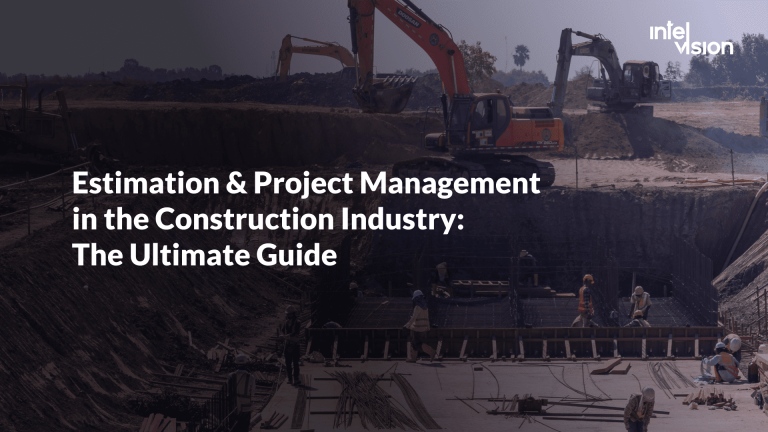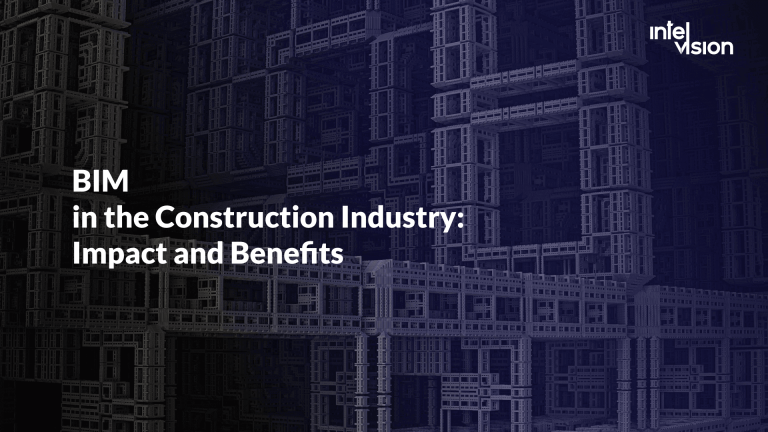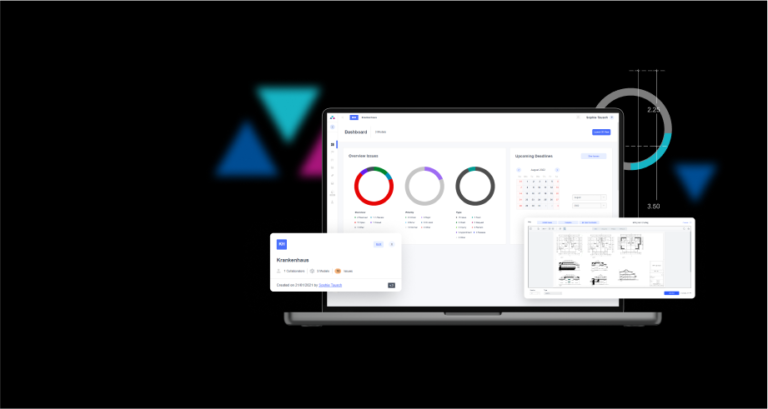
Construction Project Management Guide
Construction Project Management: The Ultimate Guide of Principles & Processes
According to the 2020 Pulse of the Profession® Report published by the Project Management Institute (PMI), 11.4% of business investment is wasted due to inefficient project management and poor performance.
Having a well-thought-out plan, the right materials, a strong team of workers, and an approved budget are all well and good, but without efficient construction project management, everything can go haywire. These days it’s no longer enough to handwrite out a rough timeline or create an excel spreadsheet that lays dormant throughout the entirety of a project.
Construction companies need to use specific construction software development services that equip them with what they need to plan and manage the project management processes.
What Is Project Management in Construction and Why Is It Important
Project Management is a process based on organization, planning, motivation, and resource management. Construction project management is needed to complete any construction project. The goal of project management in the construction industry is to guide a project to completion, and within the given project budget, time, and quality standards.
Thus, a construction project manager ensures that all elements of a construction project are supported and executed efficiently throughout the project lifecycle. A professional project manager can analyze what went sideways, what took longer, or what tasks were more demanding. Those insights will help to find the best way of moving forward.
Construction project management is the link between planning to do something and getting it done in the construction projects.
Construction project management is important in building agricultural, residential, commercial, institutional, industrial, heavy civil, and environmental structures. Construction project management typically includes complicated tasks, and it requires strong skills in communication, deep knowledge of the construction process, and the ability to problem-solve. Finally, construction project management is a complex field, requiring knowledge in many different areas like finance, mediation, law, business, etc.
Importance of Construction Project Management:
- Construction management practices help to achieve “maximum production at least cost”. That means good construction management results in the completion of a construction project within the stipulated budget (or even less).
- Construction management provides necessary leadership, motivates employees to complete the difficult tasks effectively and in time as well as extracts potential talents of the employees.
Construction management will help to avoid escalation of project costs, time overrun, wastage of resources, risks for workers at the construction site, and negative impact on the environment.
Read more: BIM in the Construction Industry: Impact and Benefits
The Main Phases of Construction Project Management
The key phases of the construction management process reflect those in traditional PM: project initiation, planning, project execution, monitoring, and, once the team meets all completion goals, project closeout.
1. Project Initiation
At the initial stage, the main goal of the project manager is to determine if the project is feasible and worth undertaking. When all stakeholders agree to proceed with the project, the project manager writes a project initiation document (PID). It includes both the business needs and the business case
2. Project Planning
Next, the project team develops a road map that includes the project management plan (PMP). It’s a formal document created to guide project execution and control, as well as set baselines for scope, cost, and schedule. You can also expect to see these documents in the planning phase:
Scope documentation: This defines the project’s needs, objectives, deliverables, and key milestones.
Work breakdown structure (WBS): This document breaks down the scope of the construction projects into visual, manageable chunks.
Risk management plan: This helps project managers identify risks beforehand, including time and cost estimates that may not be met, potential budget cuts, shifting requirements, and a shortage of committed resources.
3. Project Execution
At this stage, typically, all parties hold an additional meeting, then the project team begins the crucial work of assigning resources, implementing project management plans, setting up construction project management tools, completing tasks, updating the project schedule, and if necessary, modifying the project plan.
4. Performance and Monitoring
This phase is necessary to measure progress and performance, and to ensure that items are in line with the overall project management plan.
5. Project Closure
This final phase marks the project’s completion. To mark the conclusion, project managers may hold a meeting to discuss what parts of the project did and did not meet objectives. The project team then creates a project report.
The Functions of Construction Project Management
The functions of construction Management are planning, scheduling, organizing, staffing, directing, controlling, and coordinating. Let’s take a quick look at each of them.
Planning in Construction Management
It is the construction project management process of selecting a particular method of work. It essentially covers the aspects of ‘What to do’ and ‘How to do it’.
Importance of construction project planning:
- Project planning helps to minimize the cost by optimum utilization of available resources.
- Project planning reduces irrational approaches and duplication of work.
- Project planning encourages innovation and creativity among construction managers.
Scheduling in Construction Management
Construction scheduling is the fitting of the final work plan to a time scale. It shows the project duration and order of various construction activities. Importance of construction project scheduling, project planning, and construction process is a vital tool in both the daily management and reporting of the project progress.
Organizing
Organizing is concerned with the decision of the total construction work into various operations by delegating specific tasks to individuals.
Staffing
Staffing is the provision of the right people to each section or department created for the successful completion of a construction project.
Directing
This feature is associated with training subordinates to carry out assigned tasks, supervising their work, and motivating employees to achieve desired results.
Controlling
It involves a constant review of the work plan to check on actual achievements and to discover and rectify deviations.
Coordinating
It involves bringing together and coordinating the work of various departments. Each section must be aware of its role and the assistance to be expected from others.
5 reasons to implement project management for construction business immediately
It seems to you that everything is fine in the project, and there is no point in changing processes or construction project management methodology that have been established for a long time? We have collected the most common “alarm bells” that should be a sign for the construction team that it is time to find the perfect project management tools for construction and review all the processes in the company.
- The team works on the project longer than the deadlines indicated at the start.
- In the process of work, the conditions changed several times: the budget, the amount of time spent, the number of employees, etc.
- There is no reporting that would give an understanding of the effectiveness of the workflow as a whole, bottlenecks, and problematic issues.
- There is chaos in the team communication (something is written in the messenger, something is sent to email, and all this is lost somewhere and forgotten with time).
- Tasks are not recorded in a single system, and team members do not understand at what stage of implementation this or that task is.
Read more: ERP For the Construction Industry and Infrastructure
Common Construction Project Management Challenges & Mistakes
Even the most qualified project managers face numerous obstacles during the entire construction project’s lifecycle—from scratch to its completion. But there is a solution: accounting for these common construction project management challenges before they occur, not after, will prove pivotal to your workflow and ultimate success.
Inaccurate project estimates
To ensure your project is set up for success from the beginning, it’s important to be as accurate as possible about project deadlines during the preconstruction process. The realistic estimation will help you avoid scheduling issues down the line.
Failure to set clear goals and objectives
Every project, no matter what the nature of the business, demands clear goals and objectives. If the project manager and team members don’t know what they are working toward, the performance will inevitably suffer. However, one survey published in PM Network found that nearly a third of project managers identified unclearly defined visions and goals as the main reason why their construction projects failed.
How to solve the problem:
From the beginning, you must establish goals and objectives. Many construction professionals use the SMART framework to facilitate goal-setting. SMART stands for:
- S—specific,
- M—measurable,
- A—achievable,
- R—relevant,
- T—timed.
Use this framework to ensure you are setting proper goals to guide your construction process:
Poor communication
Poor communication is the main reason why construction projects fail, according to Forbes. With the lack of proper communication, you may run into a poor collaboration, an inability to meet deadlines, and unfinished assignments. Tasks might be repeated because Person A is unaware that Person B has already completed them.
Construction project management software can promote effective communication. A custom tool not only allows you to track progress and deadlines but also enables you to communicate goals and efforts. If you see, for example, that a specific task remains uncompleted, you can ping the individual responsible within the software itself.
Not preparing for the worst & not managing risks
Every project carries some amount of risk. While it’s impossible to completely address and negate every possible risk from the beginning, it is still important to identify and account for major risks, as well as minimize them and their effects.
How to solve the problem: you’ll need to examine potential risks associated with the construction industry and specific types of construction projects. You may need to investigate laws in your domain, too.
Tip: construction project management software can help to avoid risks. The biggest benefit of custom construction project management software when it comes to risk management is that it gives you more data and a faster method of communication.
To see how Intelvision custom software solutions could specifically reduce risk in construction projects you manage, contact us for a free consultation.
How Project Management is Changing in 2022
We figured out which key trends are changing the usual view of construction project management nowadays.
AI Technologies Will Partially Fulfill the Duties of a Project Manager
According to a study provided by the analytical platform Cognilytica, 86% of project managers approve of AI technologies. And for those who have already implemented AI, the productivity of projects increased by 20%. Artificial intelligence controls all five stages of the project life cycle: initial, planning, implementation, control, and completion.
The main advantage of AI is the processing of huge amounts of data, including extensive project documentation, as well as the performance of routine tasks. Gartner predicts that by 2030, artificial intelligence will be able to handle up to 80% of everyday PM work. What benefits will PM gain by implementing artificial intelligence in 2022:
Better decision making
AI can process data and automate simple tasks but also to eliminate the “human factor”, by providing recommendations for PM. What resources are best used to complete the task? What risks can be encountered during the project implementation? How many meetings will make the team the most productive?
Predicting results based on ML
Based on statistical data and machine learning (ML) technology, AI can not only make recommendations but also predict the success of projects. Artificial intelligence is able to assess the project life cycle and predict when task X will be completed, whether it is possible to achieve a KPI on time, and whether the project’s initial budget paid off.
Troubleshooting
In 2022, PMs are increasingly using AI technology to detect problems early in a project. How it works:
- AI captures the life cycle of a particularly successful project in a company.
- Then the AI monitors the progress of another project: it analyzes the interaction within the team, documentation, task flows, reporting, etc.
- With a blueprint for a successful project, AI can alert the project manager when a project fails at a particular stage. Otherwise, such a mistake can lead to missed deadlines, reduced productivity, and erroneous KPIs.
More efficient project teams
At the start of 2022, 53% of service companies said they planned to include the use of chatbots in their strategies over the next 18 months (up 136% from 2021). At the same time, 56% of businesses believe chatbots increase the project’s efficiency, as well as the involvement of team members. Bots are best suited for time-consuming and boring administrative tasks: data management, scheduling, documentation, and invoicing.
Also, the bot will reduce the time of internal communications by contacting team members in corporate messengers. The bot can remind colleagues about tasks, clarify the status of their completion and request reports.
No more “good” or “bad” methodologies and tools in construction project management
In the Global Trends in Project Management 2022 study, the ProjectManager IT platform surveyed more than 600 project managers. About 60% of them said that hybrid methodologies (Agile + Waterfall) or other combinations are used for project management (including construction project management). Therefore, the use of several project management tools for construction and approaches within the framework of one project is the trend of 2022.
Based on the objectives of the project, project managers choose one or more methodologies/services. In total, the Datanyze B2B platform counted 259 technologies used by PMs from 119.665 organizations.
Employees will leave teams where mental health is not a priority
Stress while working on projects can be caused by various factors. In the period from 2019 to 2021, the global causes were the COVID-19 pandemic. This is already enough for team members to experience stress in the workplace.
Lack of vision for the future, decreased level of motivation due to uncertainty about the future, fear that the project is about to close—all these negative thoughts overwhelm employees. Therefore, protecting their emotional and mental health is becoming a trend for project leaders in 2022.
According to the Microsoft Work Trend Index 2022, approximately 53% of team members prioritize their mental health and personal well-being. If the employer is not able to provide this, 24% of employees will prefer to choose a company where the psychological state of colleagues is one of the key values.
These tips will help project managers keep their employees mentally healthy:
- Regularly check the number of tasks of colleagues: make sure no one is overloaded. Meet with team members once a week and go over the daily workload.
- Work on the internal atmosphere in the team, and create a space in which the employee will feel safe psychologically. Convince colleagues that they can tell you about their problems.
- Don’t be the manager who says everyone needs work-life balance while sending an email at 2 a.m.
Read more: How to Optimize Your Construction Site Management
Make Construction Project Management Easier with Custom Software Solution
Here is where some companies get stuck in construction project management: getting started. While it’s great that there are so many options, there are so many options! Intelvision’s construction project management software will help you manage tasks in a comfortable, customizable environment that perfectly adapts to your business needs.
Create. Plan. Organize. Track. Use just one app to replace dozens of them.
- Save time by automating your work. Automate routine tasks and focus on what matters.
- Get more work done, wherever you are. Access your custom tool on any device—mobile, desktop, and more to get work done from anywhere.
- Document management. Manage and collaborate on project documents, then easily share them with project teams.
- Performance and goal tracking. Track employee performance with real-time reporting that enables you to visualize tasks completed, progress, workload, etc.
- Track progress. Track tasks, sprints, time, statuses, docs, and more.
- Integrate with platforms you already know and love. Work the way you want to—alongside all the tools you want to—without leaving your custom software solution.
We are changing the way the world builds. Intelvision connects teams, improves project efficiency, and increases profits. Our construction project management software is designed to make your business better. Leave sticky notes and spreadsheets in the past! Plan, track construction projects, and impress clients with better results. Contact us to discuss your project.









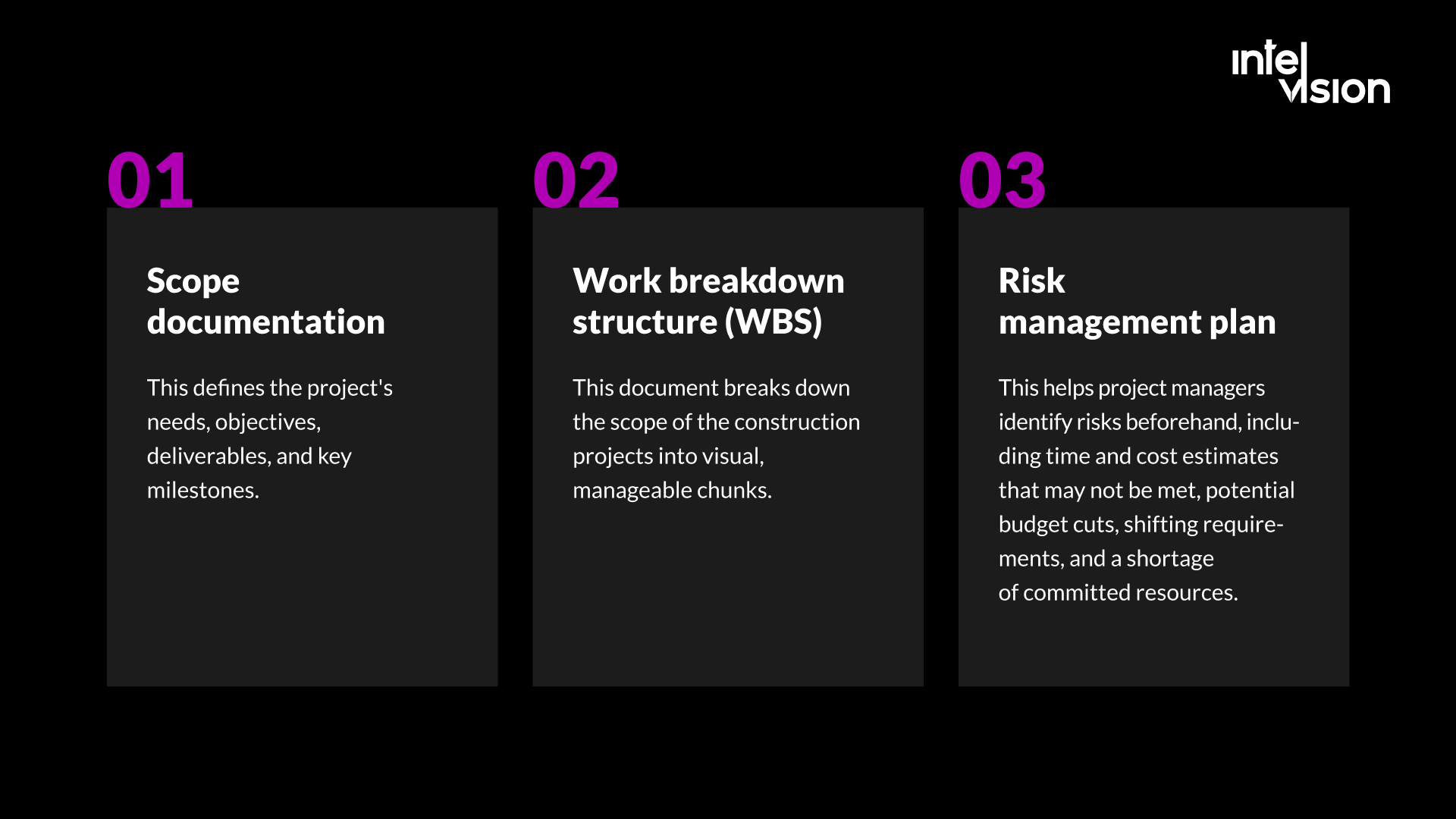
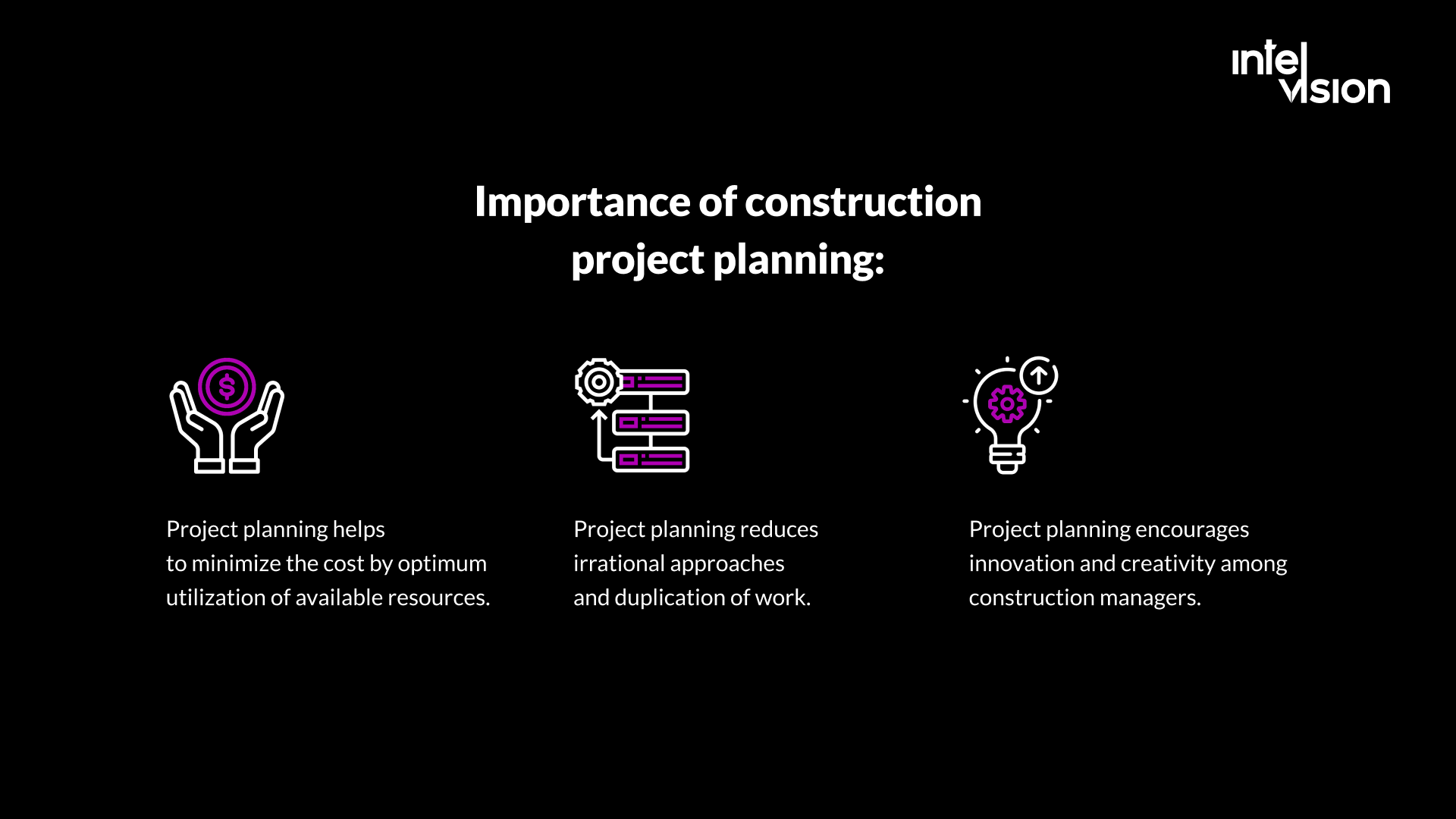
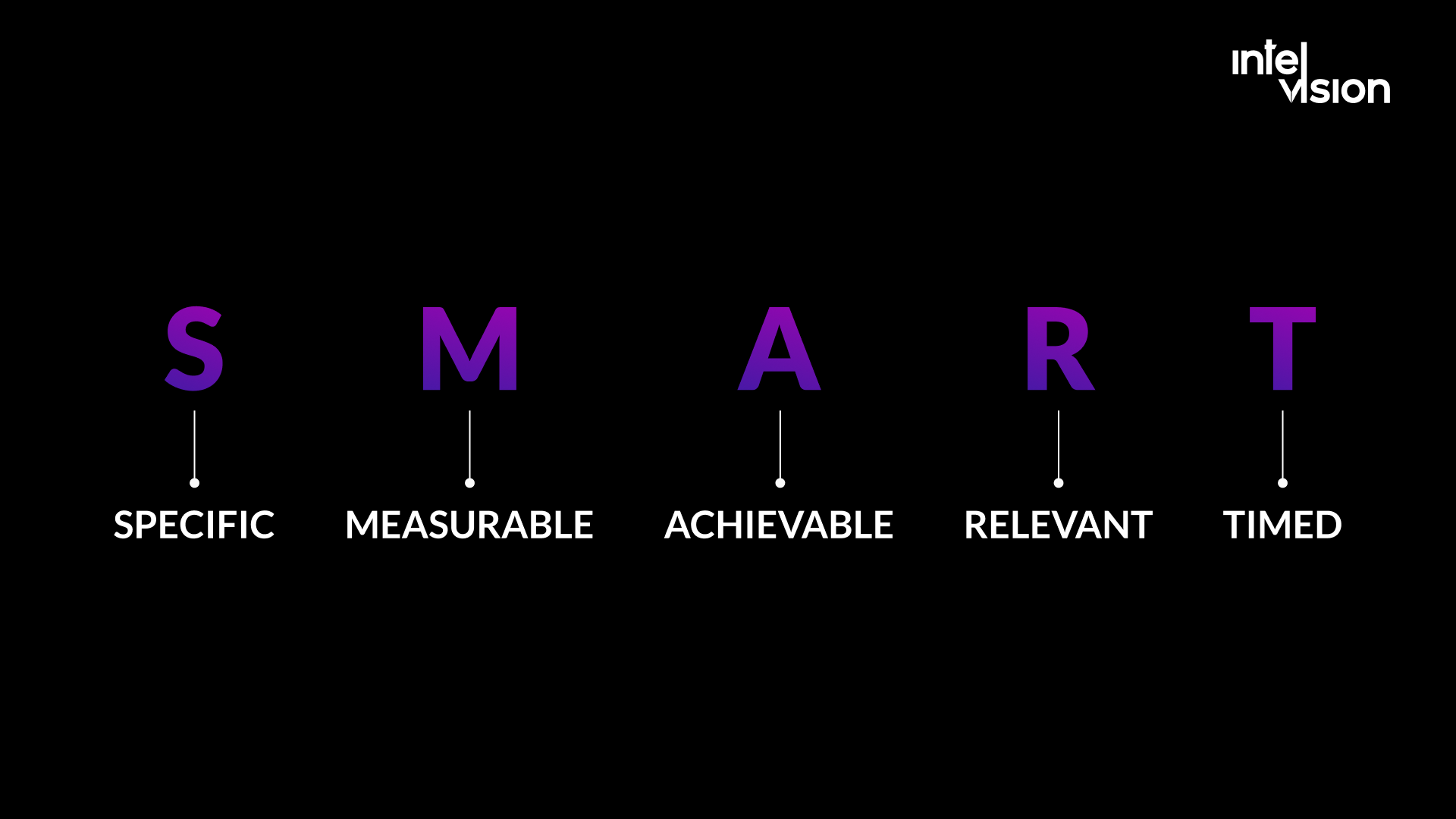
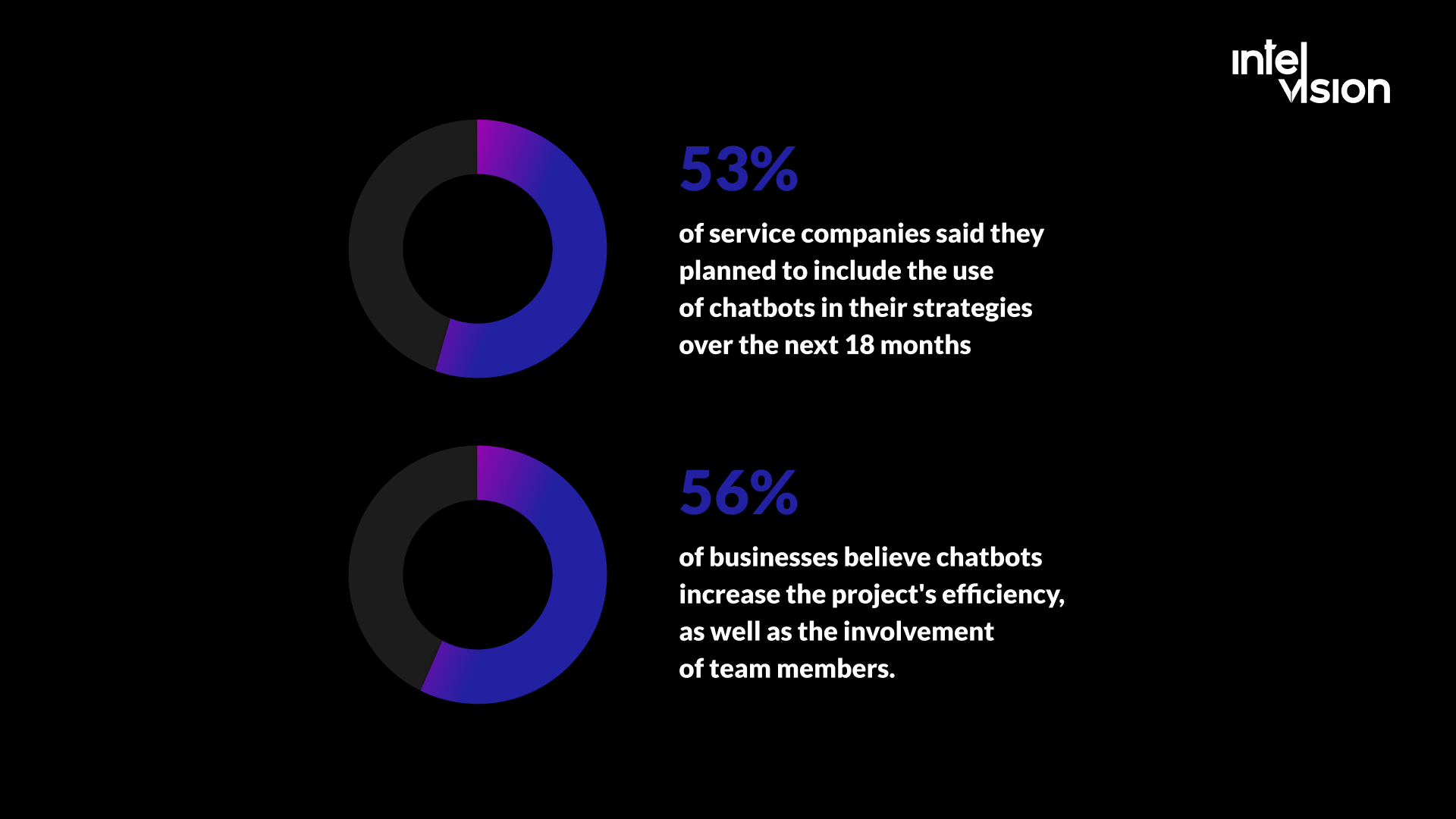

![$portfolio_img_mobile['title'] $portfolio_img_mobile['alt']](https://intelvision.pro/wp-content/uploads/2021/03/Group-892-262x350.png)

